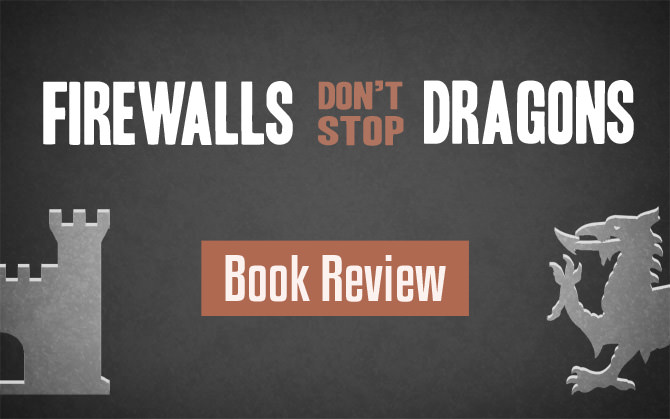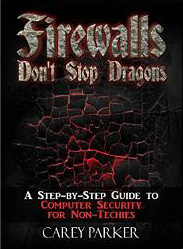This is the dawn of a new era in computing. The last two years have been a wake up call for the sleeping public. The NSA revelations of Edward Snowden, high-profile breaches of big box stores and the entertainment biz, CryptoLocker, Heartbleed, and countless more recent issues are generating more awareness among the everyday user than at any point in digital history.
So I was pleased to discover a new book this week. Firewalls Don’t Stop Dragons by first time author and software engineer, Carey Parker. I’ve just finished reading it cover-to-cover and must say I’m impressed. I’ve been searching for resources for a long time that communicate cyber safety in a manner everyone can understand, and do it well. This book is the best I’ve found so far.
Parker does an awesome job of bringing computer safety to average users and making it relevant. He’s able to make advanced security concepts fun and interesting while not compromising on knowledge. Being in the business of working with “normal” users every day in my job, it’s clear to me that Parker is able to get into the heads of his audience and ask just the right questions. Then answer them without nerdy jargon or talking down to the reader.
Before getting to the nitty gritty, Firewalls Don’t Stop Dragons takes the reader through a foundational understanding of computer, internet, and security concepts using loads of great metaphors that even Grandma can understand. Then it gets specific about how to lock down your own system, going so far as to give step-by-step instructions with screenshots and examples. What’s better, the material covers both Windows and Macintosh.
Firewalls is very thorough and you probably won’t get through it in one sitting. While I believe most readers would benefit reading it cover to cover, it could also be used as a reference guide. The chapter titles may not be clear enough for most people in the target audience to use it this way, however, which leads me to believe that it may not have been the intention of the author.
Topics include password practices, cloud storage, backups, software maintenance, Wi-Fi, secure communication, web surfing, banking and shopping online, social media, parental tips, mobile devices, and lots more. In addition to explaining each concept, at the end of each chapter is a checklist and summary that reinforces the material.
Perhaps what I like most about this book is the level-headed philosophy that Parker brings. As foreshadowed by the book title, he makes it clear that complete security (especially for the average joe) is unobtainable. That concern is addressed very well. The best we can do is the best we can do. Instead of promoting unrealistic measures, he takes us through only what’s practical for most people while still maintaining a high standard of safety.
If you’re a non-techie looking for an easy guide to get you up to snuff with the most important security measures, this is exactly what you need. I’ll admit that even I learned a few tidbits of interesting information from these pages. I’ll certainly be recommending it to my friends and family.
Check out Firewalls Don’t Stop Dragons at Amazon.
Related Articles


